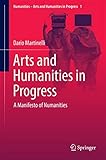Arts and humanities in progress : a manifesto of numanities / Dario Martinelli.
Material type: TextSeries: Publication details: Cham, Switzerland : Springer, (c)2016.Description: 1 online resource (xiv, 264 pages)Content type:
TextSeries: Publication details: Cham, Switzerland : Springer, (c)2016.Description: 1 online resource (xiv, 264 pages)Content type: - text
- computer
- online resource
- 9783319455532
- 3319455532
- 3319455540
- 3319833189
- AZ101 .A787 2016
- COPYRIGHT NOT covered - Click this link to request copyright permission: https://lib.ciu.edu/copyright-request-form
| Item type | Current library | Collection | Call number | URL | Status | Date due | Barcode | |
|---|---|---|---|---|---|---|---|---|
 Online Book (LOGIN USING YOUR MY CIU LOGIN AND PASSWORD)
Online Book (LOGIN USING YOUR MY CIU LOGIN AND PASSWORD)
|
G. Allen Fleece Library ONLINE | Non-fiction | AZ101 (Browse shelf(Opens below)) | Link to resource | Available | ocn960871687 |
Includes bibliographies and index.
1. Background: The Crisis of the Humanities -- 2. A Manifesto of Numanities -- 3. Case-Studies -- 4. Appendix: A Short (Pre) History of Numanities -- References -- Index of names.
The book aims to introduce a research concept called "Numanities", as one possible attempt to overcome the current scientific, social and institutional crisis of the humanities. Such crisis involves their impact on, and role within, society; their popularity among students and scholars; and their identity as producers and promoters of knowledge. The modern western world and its economic policies have been identified as the strongest cause of such a crisis. Creating the conditions for, but in fact encouraging it. However, a self-critical assessment of the situation is called for. Our primary fault as humanists was that of stubbornly thinking that the world's changes could never really affect us, as - we felt - our identity was sacred. In the light of these approaches, the main strengths of humanities have been identified in the ability to: promote critical thinking and analytical reasoning; provide knowledge and understanding of democracy and social justice; develop leadership, cultural and ethical values. The main problems of humanities are the lack economic relevance; the socio-institutional perception of them as "impractical" and unemployable; the fact that they do not match with technological development. Finally, the resulting crisis consists mainly in the absence (or radical reduction) of funding from institutions; a decrease in student numbers a decrease in interest; a loss of centrality in society. A Numanities (New Humanities) project should consider all these aspects, with self-critical assessment on the first line. The goal is to unify the various fields, approaches and also potentials of the humanities in the context, dynamics and problems of current societies, and in an attempt to overcome the above-described crisis. Numanities are introduced not as a theoretical paradigm, but in terms of an "umbrella-concept" that has no specific scientific content in it: that particularly means that the many existing new fields and research trends that are addressing the same problems (post-humanism, transhumanism, transformational humanities, et cetera) are not competitors of Numanities, but rather possible ways to them.--
COPYRIGHT NOT covered - Click this link to request copyright permission:
There are no comments on this title.
